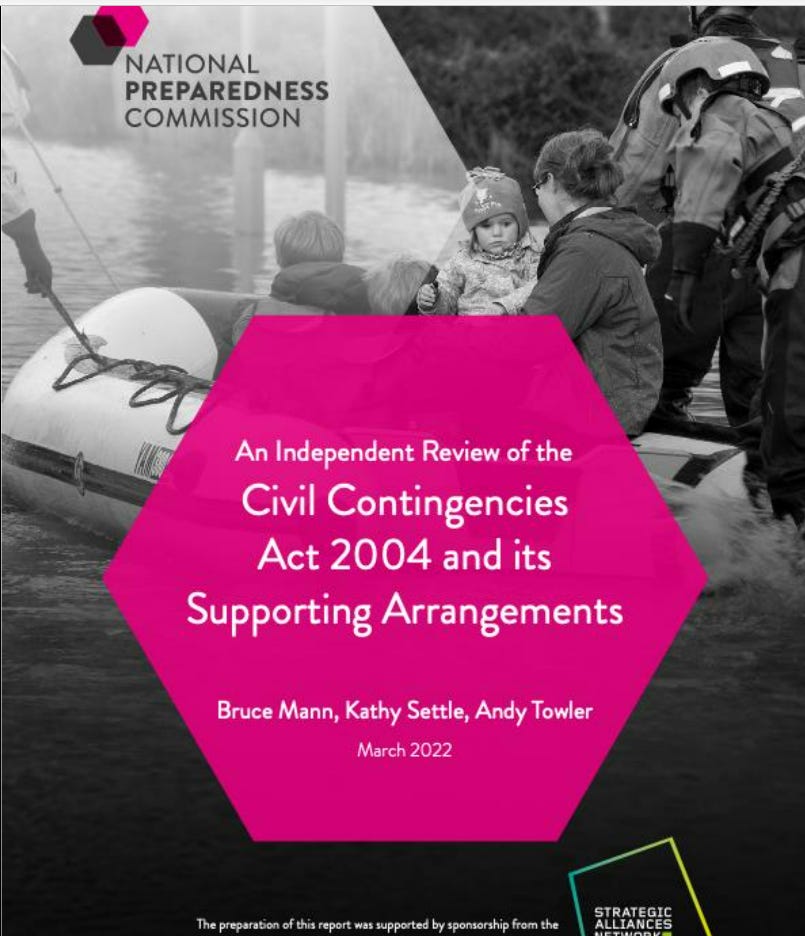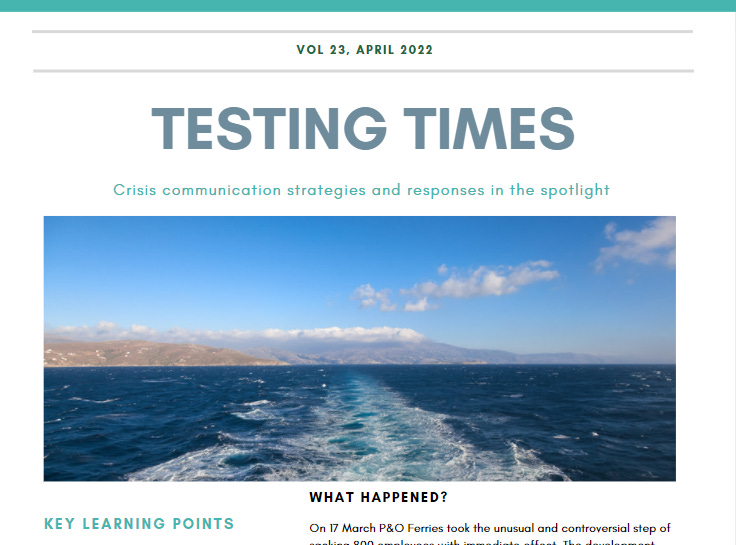Resilience approach 'suffers strategic neglect' according to report
Under Pressure 31 March 2022
“Suffering strategic neglect” - the shocking review of the UK resilience approach
The National Preparedness Review was published a week ago and although it has attracted little interest there is a lot to consider within the many pages of the report. (If you want to read the summary or the report find it here.) The basis was a review of the 2004 Civil Contingencies Act which underpins the UK work to prepare for crises. There are some important recommendations for both communicators and emergency planners.
It urges the Government to seize the moment to develop a ‘whole of society’ approach to resilience and future risks. I was pleased to see that the needs of people were put at the centre of the recommendations within the report. Here are a few quotes of note:
“Resilience in the UK has suffered strategic neglect.”
On resilience in the UK: “It has insufficient emphasis on preventing emergencies arising in the first place or at least reducing their likelihood, or of proactively designing resilience in to all aspects of our society and economy.”
On public awareness raising: “The duty in the Act to raise public awareness on risks, consequences and emergency plans is being met in only the most tokenistic way..”
The report includes a long list of recommendations that include sharing more information with the public, putting reduction and prevention on an equal footing to preparedness, ensuring partnerships are working, and to publish a Resilience Report.
So where do we go from here?
It is clear that there is a huge amount of work for the Government to do and I will be watching for the response to the Commission report. For communicators we should start to look at what we do to make people aware of risks and how they can become more resilient. We can start to ensure our internal structures and processes are in place and focusing on people. And we can ensure that we are training communicators and others in how to respond to threats, risks, and crises.
I will be working with the Emergency Planning Society Communication Professional Working Group to look at how to respond to the report.
If you are interested in training and skilling your teams in risk, resilience and crisis communication get in touch at amanda@amandacolemancomms.co.uk
Ukraine communication support
The PRCA and the ICCO have come together to create the Ukrainian Communications Support Network (UCSN). The focus is on helping to coordinate volunteers who are keen to help with a whole range of communication activities. If you are interested in finding out more about how to help check out the details here.
Book Giveaway Winner
Congratulations to Rob Pett who was chosen at random to receive a copy of my book Crisis Communication Strategies as part of the celebrations to mark the second anniversary of Amanda Coleman Communications Ltd. I hope you find it interesting Rob.
Testing Times April edition
The latest edition of Testing Times the monthly crisis communication case study has been published this week. This edition reflects on the long term implications of the P&O Ferries disaster. If you would like to see a copy email amanda@amandacolemancomms.co.uk
Easter support
Communication teams looking for some back up support and the ability to get advice quickly when issues emerge can access Easter cover. Get in touch with Amanda to discuss what support you may need during April and particularly around the two week Easter break. Don’t leave it to chance, email amanda@amandacolemancomms.co.uk
In brief:
The World Communication Forum Association has supported the UNESCO International Declaration of Communications Professionals and Researchers for a Healthier, Viable, Better World. Members of the WCFA are urged to use their communication expertise to address the biggest threats in modern life. Read about it here.
Leading boards at a time of crisis was the focus on an article in the Harvard Law School Forum on Corporate Governance. It considered research undertaken at the start of Covid-19 and looks at the lessons that others can learn. The first point covered is elevating communication and engagement while minimising distractions. There is plenty of practical advice held within the article. Find out more here.
The International Committee of the Red Cross has published a timely report ‘Harmful Information: Misinformation, disinformation and hate speech in armed conflict and other situations of violence’. Thanks to Philippe Borremans for highlighting this vital resource. Find the details here.
Professor Deepti Ganapathy who teaches at the Indian Institute of Management Bangalore has put effective communication at the heart of successfully leading through a crisis in an article for Forbes India. Read the details here.
The impact of an ‘active shooter’ situation on stores and supermarkets was covered in a recent article on GroceryDive. Preparing to deal with the media and to communicate after the incident is highlighted as an essential element. Read the details here.
Diary dates:
On 20 April Amanda will join a panel to discuss the impact of long haul issues and incidents. The session organised by the CIPR Corporate and Financial Group starts at 4pm. Find out about the session here.
Amanda is chairing the SASIG webinar on 22 April. The session at 11am will be looking at the Mandiant’s 2022 M-trends. Find out more here.
The Senior Practitioner Forum by CIPR Cymru Wales takes place on 26 April and Amanda will provide the keynote speech challenging views of reputation management within PR. More details will follow in the next edition of Under Pressure.





